
Military hospitals operate under different rules when it comes to medical injury lawsuits. This is something military families need to know if they are receiving care in one of these facilities. Since our dedicated personal injury attorneys just settled for $6.5 million with a military hospital on behalf of a brain-injured child and his family, these differences are fresh on my mind and I want to share them.
For one thing, lawsuits against government institutions, such as military hospitals, are always filed as Federal Tort Claim Actions. While they are filed in federal courts, they are not tried before a jury, but simply before a judge.
Filing Deadlines in Military Hospital Lawsuits are Crucial
Deadlines for filing a lawsuit after an injury in a military hospital are strict. First, a certified claim must be filed, with the appropriate entity, within two years after the injury. This allows the government to investigate your case and perhaps offer a settlement without going to court. As part of this notification you must estimate what the damages are. In other words, how much money is it likely going to cost to provide on-going medical care to the injured patient, or to compensate for lost wages and pain and suffering, or to compensate survivors for a death. A mistake at this point can be crucial, since you will be limited to this amount claimed for the rest of the case.
If the Government denies the claim, you must file suit within 180 days. If they just sit on it, you can go ahead and file after 180 days of non-action.
Damage Estimates Must Be filed with Military Hospital Lawsuit Notification
Arriving at this estimate takes a lot of professional input. Lawyers use certified life care planners to estimate future medical expenses for severely injured people, and economists to estimate the impact of lost wages. Compensation for pain and suffering and death is largely a matter of historical precedence based on similar circumstances. Some military hospital injury awards have been quite high.
Although they are filed in federal court, lawsuits against military hospitals also are affected by state laws. State laws also can vary widely. Therefore, an attorney who takes on a medical injury lawsuit against a military hospital must be experienced in the administrative ins-and-outs of Federal Tort Claim Actions, and also must juggle federal procedural law and state substantive law.
The lawsuit my firm just settled involved a couple at Fort Hood, TX. The husband was active duty. The lawsuit was filed by Kasie Rivera against Darnall Army Medical Center in U.S. District Court for the Western District of Texas, Austin, following the birth of their son on Sept. 12, 2008. The suit alleged doctors ignored evidence that the mother’s contractions were over stimulated by the excessive use of oxytocin causing severe distress in the baby and the need for immediate delivery by Cesarean-section. The delay in delivery resulted in oxygen deprivation to the baby in the womb and subsequent brain damage.
Military Families Deserve Full Justice
Haiden, now 5, has cerebral palsy. He cannot speak, cannot walk, and must be fed through a feeding tube. With money from the settlement, the Riveras will not have to worry about whether Haiden will be taken care of should something happen to them. They also won’t have to worry about the expense of his therapies and on-going treatment and care.
Our military families put their lives on the line for us every day. They deserve the best medical care possible. When they don’t get it—and tragedy ensues—they deserve full justice.
